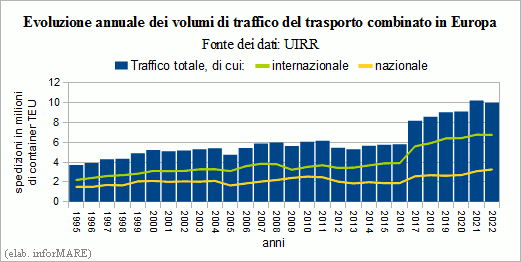
Last year, European combined transport experienced a decrease of -0.3% of shipments handled compared to 2021. This was announced by the UIRR, the association that represents the sector in European level meeting last Thursday in Assembly, explaining that if national combined transport has marked a historical peak with shipments pairs to 3,26 million container teu, with a progression of +5.6% on the previous year, instead the intra-EU shipments have accused a slight reduction of -0,5% having been pairs to 6,74 million teu and the extra-EU traffic has totaled a much more significant decrease of -48.0%.
In terms of tonne-kilometres handled, in 2022 it is an all-time high has been reached both in terms of transport combined national (16.9 billion tkm +9.5%) and intra-EU (68.5 billion tkm, +1.7%), while extra-EU traffic has suffered a decline - highlighted UIRR - which is of Unthinkable proportions having been equal to 3.1 billion Tkm (-82,2%). The result - explained the association - is a As a consequence of the war in Ukraine, which has clearly led to a hard blow to intermodal traffic outside the EU that could not be offset by additional volumes to and from Ukraine using the so-called solidarity lanes.
In addition to the volumes of shipments handled in 2022, during the The evolution of the economic scenario in which companies in the sector operate, scenario - was detected - which worsened over the course of the year with several Member States that - the UIRR has highlighted - does not were able to adequately compensate for the price increase of traction electricity having not fully utilised the EU energy instruments that were adopted during the Czech Presidency of the Union. This - observed the UIRR - has forced intermodal operators to impose surcharges for support the increase in energy prices at a time when Long-distance hauliers have benefited of a fall in diesel prices generated by a much better fossil fuels. Furthermore - he specified THE ASSOCIATION - to this price trend that has undermined the Competitiveness of combined transport has been added also the effect of poor performance of freight transport on rail, with deficiencies in punctuality of services and in Infrastructural capacity due to construction sites, strikes and Increase in passenger traffic that has had repercussions negative on intermodal freight trains. It has also been added The impact of the economic slowdown in the second half of last year.
